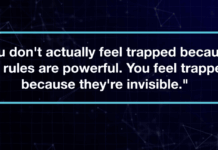From starlight432.blogspot:
Regarding desires, I will use First Contact as an example. Continually desiring First Contact while continually not having First Contact happen – this continually unfulfilled desire causes suffering and harm (anger, depression, and so forth).
In order to no longer be harmed, continually unfulfilled desires need to be released. This is ‘giving up.’ This is letting go of desires that are continually not being fulfilled. In the case of First Contact, maybe it will happen sometime in the future, but it will be experienced from a more stable standpoint if the desire is first released.
People who strongly desire to live in a Civilized Galactic Society could very easily become suicidal if living in a dystopian, anti-CGS environment. Strongly desiring to live in a CGS while existing in the complete opposite of a CGS – this is an extremely large distance between what is desired and what actually exists for these people, which is the perfect recipe for suicide among these people (and I’m one of them.) This is why it’s so important to let go of these kinds of desires and find inner peace – this has become a matter of necessity.
The most powerful way I’ve found to let go of continually unfulfilled desires, or at least stop continually unfulfilled desires from causing harm, is by reading and re-reading Eckhart Tolle’s works. For those who prefer audiobooks, Eckhart Tolle narrates his book “The Power of Now” that can be found for free on youtube. People can even listen to this while playing video games!
It’s said that desire is the root of all suffering. I’m beginning to see this. Everyone wants something in life though. It’s ok to want something, but it’s very important to not be consumed by it, especially if it doesn’t come true in the not-too-distant future.
Disclaimer: We at Prepare for Change (PFC) bring you information that is not offered by the mainstream news, and therefore may seem controversial. The opinions, views, statements, and/or information we present are not necessarily promoted, endorsed, espoused, or agreed to by Prepare for Change, its leadership Council, members, those who work with PFC, or those who read its content. However, they are hopefully provocative. Please use discernment! Use logical thinking, your own intuition and your own connection with Source, Spirit and Natural Laws to help you determine what is true and what is not. By sharing information and seeding dialogue, it is our goal to raise consciousness and awareness of higher truths to free us from enslavement of the matrix in this material realm.
 EN
EN FR
FR




























Suicide isn't easy, I know, I've tried many times, if it's not your time it'll be unsuccessful, death comes in God's time!
Turns out I've a God given role to play in this new reality, due to being old…we must be close!
fyi, if someone tells you about wanting to commit suicide, it's a cry for help. I never told anyone of my attempts, except for you folks, and I'm glad I'm here to say so.
Funny ironic turn of events, from youth declined participating Medical system, no colonoscopy for me, likely my savings Grace!
I enjoy your posts, but feel I should point out that having too large a distance between what you want and where you are isn't the primary cause of suicide.
Suicide is complex and multi-faceted in that there are usually a number of different background and situational factors influencing it, including mental illness, trauma, abuse, alcohol/substance misuse, chronic pain and/or illness, loss and bereavement, feelings of shame, guilt, hopelessness, loneliness, not belonging, social pressure/social perfectionism, academic/performance pressure, feeling burdensome, money/debt problems, poverty, relationship problems, housing problems, unemployment, lack of access to support services, and so on.
I am a trainer for a well-known suicide-related charity in the UK, and whilst it may be frustrating to experience a large or even extremely large distance between what you want and where you are, it is not considered a primary (or even, to my knowledge, secondary) risk factor for suicide.
Maybe surprisingly, in the UK at least, suicide rates went down in 2020 rather than up. I don't know if this was true of other countries. We won't have the data for 2021 for some time (it can takes months or even years for inquests/coroners' reports to be submitted), but it will be interesting to see what happens.
I'm not sure about desire being "the root cause of all suffering" either. It's our thoughts generally that cause us to suffer – worry, fear, self-doubt, over-thinking, and so on… all fear-based. It's probably more accurate to say that fear-based thinking is the root cause of suffering.
I do agree that practices such as mindfulness, being present ('The Power of Now' stuff) can be very helpful to anyone experiencing depression (relating to the past) or anxiety (relating to the future).
Sorry to be disagreeable today!
All the different background and situational factors you mentioned are examples of having a great distance between what is wanted and what is. For example, trauma and abuse could cause suicide by needing to heal from the trauma and abuse but not healing – the distance is too great between the healing and remaining unhealed. Chronic pain or illness would be needing to not suffer anymore but being unable to stop suffering, and this too-great-a-distance between physical suffering and relief from physically suffering could cause suicide. Poverty would be wanting to have money but not obtaining money, and so the too-great-a-distance between being poor and having a home could cause suicide. The person desperately wants a home but never gets the money to have a home, and it's so far away as to be perceived as completely unattainable, and he/she becomes so miserable from this that he/she decides to commit suicide. On and on I could go with all the factors you mentioned. They are all examples of a too-great-a-distance between what is wanted and what is, or what is perceived to be what is. I could have added the element of perception.
The only other thing I would change would be to say that in some cases of suicide, a want is not met, and in other cases of suicide, a need is not met.
Thank you for your feedback.
Low self esteem, does not honor everyone equally, actually. feelingly believes one is only as good as what you have. If abused in this state, they commit suicide. On other hand, many reasons people want to commit suicide.